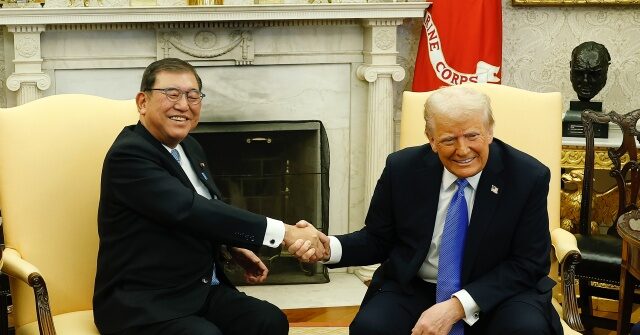President Donald Trump’s reciprocal tariffs have helped open trade negotiations between the United States and one of its key economic partners — Japan.
Last week, Trump announced reciprocal tariffs, a policy that has the United States set tariffs based on the rate that each country in the world imposes on the U.S. For Japan, the tariff rate with the U.S. is now 24 percent.
As a result, Japanese Prime Minister Shigeru Ishiba is looking to negotiate trade with the Trump administration.
“Countries from all over the world are talking to us. Tough but fair parameters are being set. Spoke to the Japanese Prime Minister this morning. He is sending a top team to negotiate!” Trump wrote on Truth Social. “They have treated the U.S. very poorly on trade. They don’t take our cars, but we take MILLIONS of theirs. Likewise, agriculture, and many other ‘things.’ It all has to change, but especially with CHINA!!!”
Truth Social
Similarly, Treasury Secretary Scott Bessent said he and U.S. Trade Representative (USTR) Jamieson Greer have been tasked “to open negotiations to implement the President’s vision for the new Golden Age of Global Trade with [Japanese Prime Minister] Shigeru Ishiba and his Cabinet.”
“Japan remains among America’s closest allies, and I look forward to our upcoming productive engagement regarding tariffs, non-tariff trade barriers, currency issues, and government subsidies. I appreciate the Japanese government’s outreach and measured approach to this process,” Bessent wrote on X before singling out China for its retaliatory approach:
China has chosen to isolate itself by retaliating and doubling down on previous negative behavior. Over 50 countries have responded both openly and positively to @POTUS @realDonaldTrump ’s historic action to create a fairer, more prosperous system of global trade. We look forward to meaningful negotiations with them over the coming weeks. [Emphasis added]
United States trade negotiations with Japan are critical as trade deficits have continued to eliminate American jobs.
“Each $1 billion in exports to another country from the United States supports some American jobs. However, each $1 billion in imports from another country leads to job loss — by eliminating existing jobs and preventing new job creation — as imports displace goods that otherwise would have been made in the United States by domestic workers,” Economic Policy Institute (EPI) researchers note.
Last year, the U.S. trade deficit with Japan was more than $68 billion. The year prior, the U.S. trade deficit with Japan reached over $71 billion. Already, this year, the U.S. trade deficit with Japan is $11.5 billion.
John Binder is a reporter for Breitbart News. Email him at [email protected]. Follow him on Twitter here.
Read the full article here
